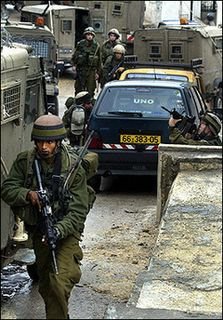We'll study any Israeli talks offer: Hamas PM

Israeli soldiers take part in an arrest operation in the West Bank city of Nablus. Palestinian prime minister Ismail Haniya said his Hamas-led government would study any Israeli offer for negotiations following an unprecedented peace overture to the United Nations.(AFP/Jaafar Ashtiyeh)

April 6, 2006
GAZA CITY (AFP) - Palestinian prime minister Ismail Haniya said his Hamas-led government would study any Israeli offer for negotiations following an unprecedented peace overture to the United Nations.
His foreign minister Mahmud al-Zahar's letter to UN chief Kofi Annan, which spoke of a desire to live at peace alongside the Palestinians' neighbours, came a week after an Israeli election whose winner Ehud Olmert has threatened to unilaterally fix the region's borders during his term in office.
Hamas, which itself only took the reins of power last week, is already facing a financial crisis as a result of Israel's refusal to hand over customs duties to a Palestinian Authority led by the Islamists.
With the West also threatening to cut funding unless Hamas radically overhauls its platform, the financial plight of the new administration has further underlined the need to improve its diplomatic standing.
Although Hamas is still committed in its charter to the Jewish state's destruction and refuses to renounce violence, Haniya said he had no objection to contacts on practical issues and would not rule out political negotiations.
"Nothing stops ministers from having contacts with the Israelis to deal with matters connected to daily life, business and the economy," Haniya said.
"When it comes to political negotiations, that poses a problem because they subscribe to a political vision. We are waiting on what is proposed to us, we will study it and decide on our position."
Israel's acting premier Olmert, set to head a new coalition, has refused to have contact with Hamas. While he says he would prefer to fix the Jewish state's final borders in a peace agreement, he is also prepared to go it alone.
As part of a series of measures designed to put the squeeze on Hamas, Israel has frozen its payment of customs duties, worth around 50 million dollars a month, which it collected on behalf of the Palestinian Authority.
Haniya acknowledged that the authority's coffers were now empty and that it would struggle to pay government employees.
"We are making every effort to pay the government employees despite the financial crisis," Haniya said. "We inherited a situation in which we not only have no money in the treasury but a whole load of debts."
The strain on an already donor-dependent government is likely to grow if the European Union and United States act on threats to slash their contributions, unless it recognises Israel and commits itself to non-violence.
In a bid to curb corruption in the Palestinian Authority, the Hamas cabinet announced it was freezing all political appointments made by the previous Fatah government.
The newly elected cabinet also requested its ministers to make public all their revenues.
In his letter to Annan, copies of which were obtained by AFP, Zahar said the new Islamist government was looking for peace and independence side-by-side with its neighbours while not specifically mentioning Israel.
"We look forward to live in peace and security and for our people to live a dignified life in freedom and independence, side-by-side with our neighbours in this sacred part of the world," the text said.
The language was similar to an internationally backed roadmap peace plan which calls for the establishment of a Palestinian state alongside a secure Israel, which has been rejected by Hamas.
Its most eye-catching reference was to hopes for the realisation of a two-state solution, albeit mixed with blame for Jewish settlement activities and accusing Israel of seeking to annex the occupied Jordan Valley.
"This will ultimately diminish any hopes for the achievement of settlement and peace based on a two-state solution," it said.
Zahar later told the BBC that reference to the two-state solution had been included as a result of a bureaucratic error by a colleague who sent the letter.
"I asked him please cancel this but they didn't. That's the mistake," he said.
Initial reaction from the Israeli government was cool.
"In this letter, the Palestinian foreign minister talks about cooperation and peace in the region, but unfortunately he talks of the region without Israel," foreign ministry spokesman Mark Regev told AFP. "In no part of this letter does he mention the existence of Israel."
In another development Hamas sources said the Palestinian minister for Jerusalem affairs, Khaled Abu Arafeh, was arrested on Thursday by Israeli security on the outskirts of the holy city.
Abu Arafeh, a member of the militant Islamist movement, was detained at a checkpoint at the entrance to al-Azaria, a suburb of east Jerusalem which is technically part of the occupied West Bank.
The sources said Abu Arafeh, one of the 24 ministers in the Hamas-led cabinet which was sworn in last week, had been travelling to al-Azaria to inaugurate new political offices.
A Jerusalem police source said Israel's domestic Shin Beth security agency was handling the case and referred all questions to the prime minister's office, which was not immediately available for comment.
Israel bans all political activity in east Jerusalem, which the Jewish state occupied in the 1967 Middle East War and subsequently annexed.














0 Comments:
Post a Comment
<< Home